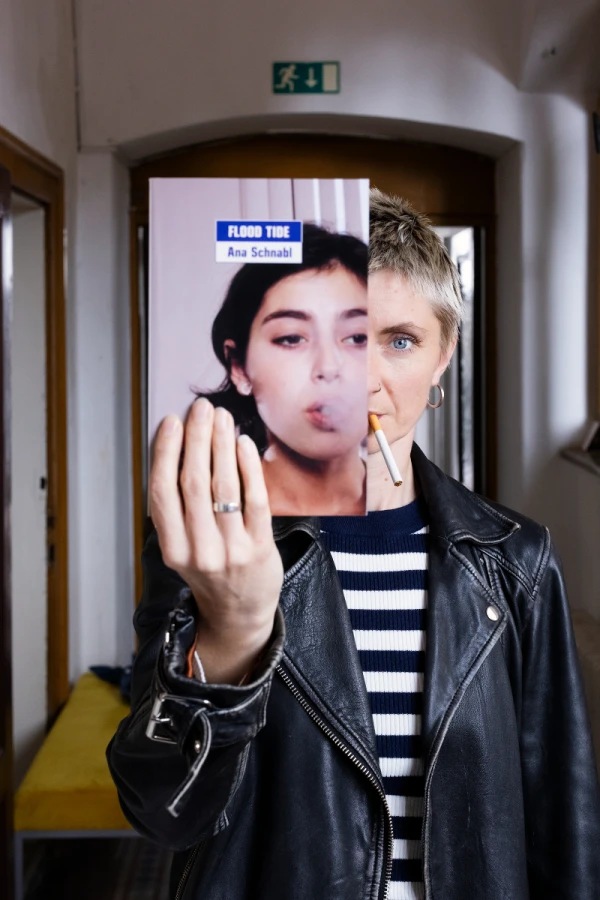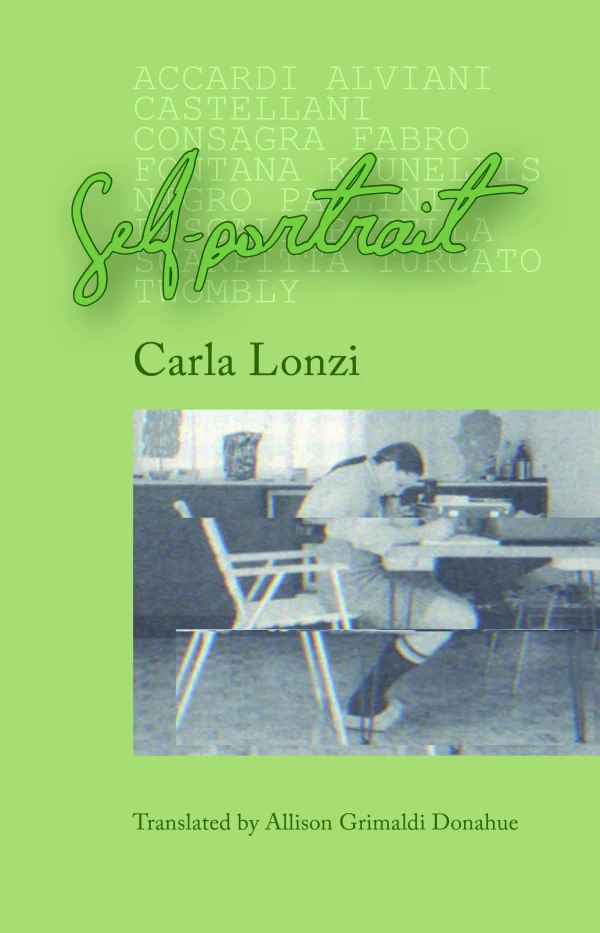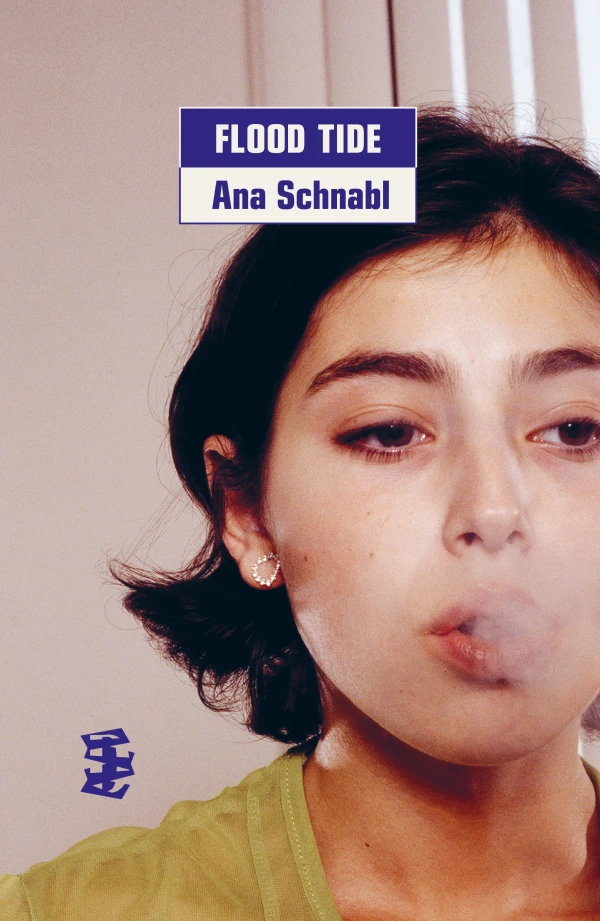Carla Lonzi (b. 1931, Florence; d. 1982, Milan) was an art critic and feminist activist best known for her work with Rivolta Femminile, a feminist collective created in 1970. Following the publication of Autoritratto ('Self-portrait') in 1969, Lonzi published Manifesto di Rivolta femminile (1970), Sputiamo su Hegel. La donna clitoridea e la donna vaginale e altri scritti (1974) and Taci, anzi parla. Diario di una femminista (1977). Due to her uncodified practice, she occupies a singular position within post-war Italian politics and art, and is a crucial figure of European feminism.
Self-portraittrans. Allison Grimaldi Donahue
Self-portrait
Carla Lonzi
trans. Allison Grimaldi Donahue
Recorded and transcribed throughout the 1960s, Carla Lonzi’s Self-portrait ruptures the narration of post-war modern art in Italy and beyond. Artmaking struck Lonzi as an invitation to be together in a ‘humanly satisfying way’, and this experiment in art-historical writing is a testament to her belief. Lonzi abolishes the role of the critic, her own, seeking change over self-preservation by theorising against the act of theorising.
Afterword by Claire Fontaine.
Shortlisted for the 2022 ALTA Italian Prose in Translation Award.
- 978-1-9164250-8-8
- 105 b&w illustrations
- 21.6 x 13.9 cm
- 364 pp.
- Paperback
- 15 November 2021
About the author
About the translator
Allison Grimaldi Donahue (b. 1984, Middletown, Connecticut) is the author of Body to Mineral (Publication Studio Vancouver, 2016) and the co-author of On Endings (Delere Press, 2019). Her writing and translations have appeared in The Brooklyn Rail, Words without Borders, Flash Art, BOMB, NERO and Tripwire, and her performances have been presented in Italy at Gavin Brown's enterprise, MAMbo, MACRO and Short Theatre. She is a 2021–22 resident of Sommerakademie Paul Klee, Bern. She lives in Bologna.
Endorsements (1)
Before she spurred everyone to spit on Hegel, Carla Lonzi arranged her Self-portrait in the form of a dialogue recorded with friends – artists – with whom she had been in conversation for years. She wanted to feel less alienated, to figure out a way for art to be a part of living, not a stupid contrivance to be consumed. Soon after the book was published, in order to continue to ‘live life in a creative way, not in obedience with the models that society proposes over and over’, she abandoned art criticism, but not art – and never life.
Press (13)
Flood Tidetrans. Rawley Grau
Flood Tide
Ana Schnabl
trans. Rawley Grau
A dazzling mix of narrative styles (even genres), a linguistic rollercoaster, and a book that demands both close attention and literary sensibility . . . The reader is hooked.
Mysterious, precise and haunting, Flood Tide suggests that every homecoming is a return to a crime scene.
In moderate physical decline, and with an immoderate weed habit, the novelist Dunja Anko returns home to the Adriatic coast to play detective and solve the mystery of her brother’s death. The going is arduous, the people inscrutable; her old friends have had years to forget – or to convince themselves they don’t remember. Dunja must contend with desire and disgust, curiosity and fear, as she begins to doubt her reasons for returning. Elegantly plotted, funny and self-reflexive, Flood Tide is a psychologically deft exploration of the trauma wrought by human limitation and indecision.
- 978-1-7395161-5-4
- 21.6 x 13.9 cm
- 232 pp.
- Paperback
- 27 October 2025
About the author
Ana Schnabl (b. 1985) is a Slovenian writer and editor. She writes for several Slovenian media outlets and is a monthly columnist for the Guardian. Her collection of short stories Razvezani (Beletrina, 2017) met with critical acclaim and won the Best Debut Award at the Slovenian Book Fair, followed by the Edo Budiša Award in Croatia; the collection has been translated into German and Serbian. Three years later Schnabl published her first novel Masterpiece (Mojstrovina, Beletrina, 2020). She toured Europe with the English, German and Serbian translations of the book, which included a residence in the Museumsquartier in Vienna, the Literarisches Colloquium Berlin, and the first European Writer’s Festival in London. The novel was given favourable reviews and mentions in numerous Austrian, German and English media, and was longlisted for the Dublin Literary Award. Her second novel Flood Tide (Plima, Beletrina, 2022) was nominated for the Slovenian Kresnik Award. Her third novel September (Beletrina, 2024) won the Kresnik Award in 2025.

About the translator
Rawley Grau has been translating literary works from Slovenian for over twenty years, including by such first-rate novelists as Dušan Šarotar, Mojca Kumerdej, Sebastijan Pregelj, Gabriela Babnik and Vlado Žabot. Six of his translations have been longlisted for the Dublin Literary Award, while his translations of Šarotar’s Panorama and Billiards at the Hotel Dobray were shortlisted for the Oxford-Weidenfeld Translation Prize. He has also translated poetry by Miljana Cunta, Miklavž Komelj, Janez Ramoveš and Tomaž Šalamun, among others. In 2021, he received the prestigious Lavrin Diploma from the Association of Slovenian Literary Translators. Translations from other languages include A Science Not for the Earth: Selected Poems and Letters by the Russian poet Yevgeny Baratynsky, which received the AATSEEL prize for best scholarly translation, and, co-translated with Christina E. Kramer, The Long Coming of the Fire: Selected Poems by the modernist poet Aco Šopov, which won the 2025 International Dragi Award for best translation from Macedonian. Originally from Baltimore, Maryland, he has lived in Ljubljana since the early 2000s.
Endorsements (7)
If you can imagine a story that’s an unsettling mix of psychological meltdown and detective story, featuring a stoned novelist wracked with back pain, going back to her hometown in Slovenia to masquerade as a Philip Marlowe wannabe to finally find out why her older brother died, and uncovering secrets about her friends and herself she probably would rather not have known, congratulations: you’ve just imagined Ana Schnabl’s brilliant Flood Tide. Readers, come for the moments of revelation, stay for the sight of a writer unravelling her characters until they’re left raw, and you’re left hooked.
Ana Schnabl’s new novel openly defies conventional literary genres: Are we reading a family drama, a troubled homecoming story or a marijuana-infused psychological novel? In a sleepy seaside town in contemporary Slovenia, nothing is what it seems, and no one is what they purport to be … An exciting, brilliantly written book, in which the reader shall not resist stepping into the detective’s shoes.
A singularly haunting and stylistically inventive novel on the primal scenes of family origins and sibling trauma. Revitalising tropes from the detective novel, elegy, and sharp social comedy in present-day coastal Slovenia, it sings and fizzes from the page.
Schnabl’s prose is matter of fact and yet somehow thrilling. She writes with absolute clarity. Stunning.
A fizzing fox in the hen-house of cosy British crime novels. Move over Richard Osman.
A hometown return story with a turn of darkness: surreality both connecting and at once disconnecting the banal with the strangeness of grief.
We enter the story as if eavesdropping on real people – something the heroine herself confirms when she says the tale would not unfold as a psychological, sociological or crime novel, but as life itself.



